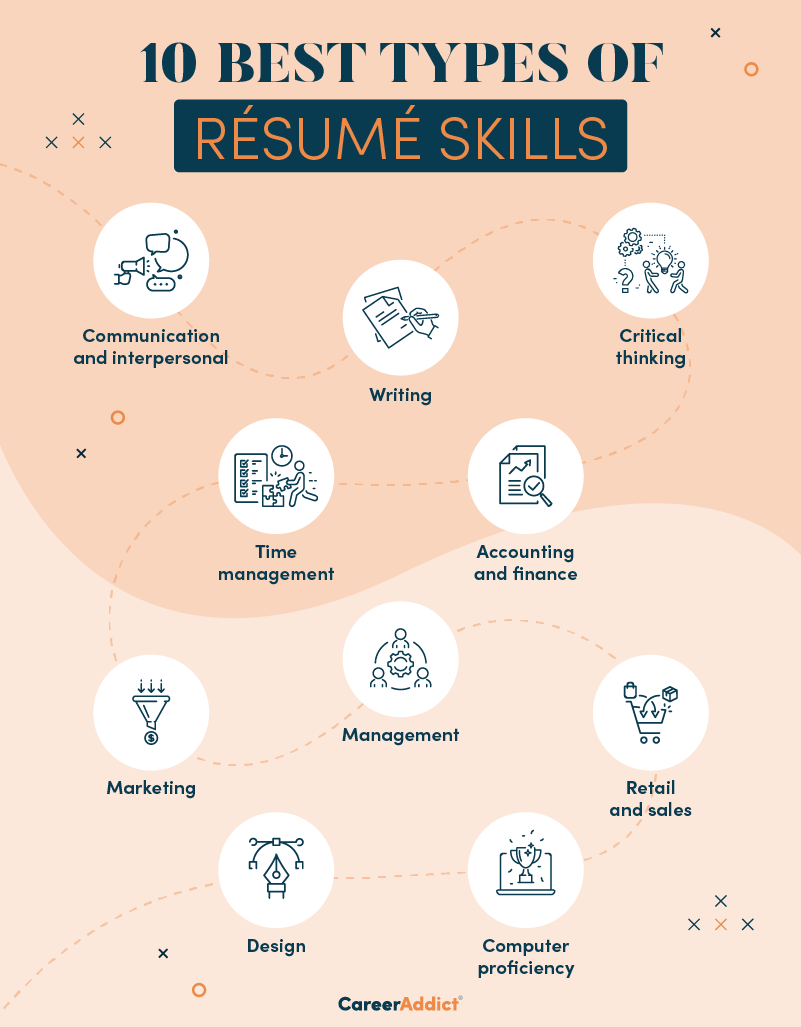When writing your résumé or CV, you’ll probably be focusing on your education and experience. But a PhD or a five-year stint at a family-run business will only get you so far. Indeed, employers care more about seeing that you have what it takes to do the job you’re applying for.
And they look at the practical professional skills that you bring to the table to determine this. As such, it’s imperative that you carefully and strategically market your top skills to potential employers during the résumé-writing process if you want a fighting chance in your 2023 job search.
But which key skills should you put on your résumé, and how?
In this article, we’ll answer those questions — and more.
TABLE OF CONTENTS
The importance of adding your best skills to your résumé
There are many important reasons to create a résumé skills section.
Firstly, you’re expected to. As one of the five main sections of a résumé, omitting this makes you look careless and unprofessional, and inevitably results in your application’s rejection — even if you are the most qualified candidate.
Secondly, and perhaps most importantly, employers want to know you have the abilities required to succeed in the job you’re applying for, and listing your skills in your résumé helps you reveal the important information they’re seeking. Essentially, it’s your opportunity to quickly show what you bring to the table, what you’re capable of and that you’re a perfect fit.
And last but certainly not least, including job-specific skills and keywords in your résumé helps you get past applicant tracking systems. If these tools can’t locate any correlation between your application and the position, they’ll automatically discard your résumé — before it’s even read by a human recruiter.
Top 100 skills to include in your résumé
Need some inspiration? Check out our list of the 100 best skills to put on your résumé, organized by type:
Communication and interpersonal skills
Effective communication is essential for both individual and team success, and is a skill that every single employer looks for in candidates. Some of the best communication and interpersonal skills you should convey in your résumé include:
- Active listening
- Collaboration
- Communication (verbal, non-verbal, visual and written)
- Conflict management
- Emotional intelligence
- Mediation
- Negotiation
- Persuasion
- Public speaking
- Presentation
Writing skills
Good writing skills are required in almost every industry and every job, whether it’s at the core of the role or a small part of the position’s responsibilities. Examples of writing skills to put on your résumé include:
- Blogging
- Content management systems
- Editing
- Journalism
- Proofreading
- Publishing software
- Researching
- Storytelling
- Style guides (such AP and MLA)
- Writing (including copywriting, report writing and technical writing)
Critical thinking skills
Employers want employees who can not only identify problems but also solve them. As such, it’s always a good idea to highlight your critical thinking skills on your résumé, whether it was solving a problem or making a quick decision. Good skills that demonstrate critical thinking include:
- Brainstorming
- Conceptual thinking
- Cost-benefit analyzing
- Creative thinking
- Deductive reasoning
- Evaluating
- Evidence collecting
- Inductive reasoning
- Observing
- Troubleshooting
Time management skills
Good time management helps you achieve bigger goals, reduce procrastination and increase your productivity — which is exactly what employers want from you. Key skills to highlight in your résumé include:
- Delegation
- Goal-setting
- Multitasking
- Organization
- Planning
- Prioritization
- Resource management
- Scheduling
- Strategic thinking
- Time tracking
Accounting and finance skills
Although highlighting these types of skills is mostly beneficial to financial professionals, more and more industries are increasingly requiring some basic form of accounting and finance proficiency. Below are some useful skills worth showcasing:
- Accounting software (such as QuickBooks and NetSuite)
- Billing and invoicing
- Budgeting and forecasting
- Cashflow analysis
- Expense tracking
- Financial reporting
- Mathematical comprehension
- Payroll
- Tax planning
- Vendor management
Management skills
If your current or target role involves managing people or projects (or both), you’ll need to prove to potential employers that you have what it takes to be successful. Key skills for management roles and functions include:
- Adaptability
- Change management
- Employee development
- Leadership
- Mentoring
- Problem solving
- Project management
- Risk management
- Team-building
- Training
Marketing skills
Since marketing controls the way a company functions, many employers look for employees who possess a variety of skills in this area. Here are 10 good examples for your résumé:
- Customer relationship management
- Data analytics
- Email marketing
- Google Ads
- Google Analytics
- Mobile advertising
- Search engine marketing
- Search engine optimization
- Social media marketing
- Video marketing
Retail and sales
If you’re in a customer-facing role, your retail and sales skills should take centerstage on your résumé. Some good examples to list in your skills section include:
- Buyer engagement
- Buyer-responsive selling
- Closing
- Cold-calling
- Customer service
- Empathy
- Friendliness
- Lead generation
- Product knowledge
- Understanding body language
Design skills
Design skills are no longer restricted to creative professionals who design products and experiences for consumers, and are often required across a wide range of industries and roles. Here are some examples of useful design skills for your résumé:
- Adobe Illustrator
- Adobe Photoshop
- Graphic design
- Layout development
- Photo and video editing
- Typography
- User experience development
- User interface development
- Web design
- Wireframing
Computer skills
As most jobs today require at least some basic knowledge of information and communication technology, it’s always a good idea to showcase your computer skills on your résumé. Some of the best examples worth listing include:
- Cloud computing (such as AWS and Google Cloud)
- Databases (such as Oracle RDBMS and MySQL)
- Machine learning
- Operating systems (such as MacOS and Windows)
- Presentation software
- Programming/coding (such as HTML, Ruby on Rails and C++)
- Project management software
- Spreadsheets (such as Excel and LibreOffice)
- Systems and networks
- Word processing (such as Google Docs and Microsoft Word)

How to list skills in your résumé
Now that you have a general idea of what skills to put on your résumé, you’re probably wondering how to go about listing them.
Here are some quick tips to keep in mind:
- Showcase your job skills as a bulleted list in a dedicated section towards the end of your résumé. To save space, you can group similar skills together under specific categories or themes — for example: “Frameworks: Django, Laravel, Meteor”.
- Make sure to strategically refer to both your hard and soft skills throughout your résumé — not just in the skills section. For example, adding “Managed a team of 15 outbound sales specialists” as a bullet point in your experience section clearly encapsulates your leadership skills.
- Always choose skills that are directly relevant to the position you’re applying for. Read the job description to get a better idea of what the employer is looking for, and match your unique skill set to the specific job requirements.
Example résumé skills for specific jobs
Here are a few examples of résumé skills sections for different professions:
Web content editor
Web content editors rely on a mix of soft and hard skills that embraces technology to be successful in their job, which they should always highlight in their résumé — as done in the following example skills section:
- CMS platforms (HubSpot, Wix, WordPress)
- Content calendar management
- Content proposals
- Editing and proofreading
- Fact-checking
- Google Analytics
- Project management
- Public speaking
- Search engine optimization
- Social media management
Nurse
Working as a nurse requires a very specialized and technical skill set, and employers want to know you have exactly what it takes to succeed on the job. The following list of skills can be useful when writing your nurse CV or résumé:
- Clinical nursing
- Communication
- CPR and BLS skills
- EMR charting
- Medication management
- Patient assessment
- Patient safety and wellbeing
- Problem solving
- Teamwork
- Urgent care
Teacher
Teachers require a variety of skill sets to effectively create lesson plans, instruct students and interact with parents, and it’s essential that they market these skills to prospective employers — like in the example skills section below:
- Behavior management
- Compassion and empathy
- Conflict resolution
- Classroom management
- Curriculum planning
- Effective communication
- Leadership skills
- Performance evaluations
- Project management
- Teaching methods
FAQs about résumé skills
Got questions about résumé skills? We got answers!
What are professional skills?
Professional skills are competencies and abilities that help you succeed in a job. They consist of hard skills (which are learnable, and which allow you to perform job-specific tasks, such as copywriting and graphic design) and soft skills (personal habits or traits that shape how you work, which are developed over time, such as creativity and emotional intelligence).
How many skills should you list in your résumé?
For most jobseekers, listing between 10 and 15 skills is generally adequate. Any more than that, and you risk making your résumé look cluttered and unfocused. The most important thing to remember when listing your skills, though, is to choose the ones that are most relevant to the position you’re applying for.
What skills should you include if you have no experience?
If you’re just starting out in your career or you’re moving into an industry in which you have no (or little) relevant experience, your best bet is to focus on your transferable skills.
These are skills that have been acquired throughout your life (either in a personal, professional, academic or voluntary capacity) and can be applied to any job and work environment. For example, if you led a project team or founded an organization at university, you could use this experience to showcase your leadership skills.
Where is the best place to include skills in your résumé?
Traditionally, skills are listed towards the end of a résumé, after the experience and education sections and before supplemental sections for things like awards and professional memberships.
If you’re using a skills-based format for your résumé, meanwhile, you’ll need to add a skills summary section (immediately after your career profile) in addition to the standard skills section. Here, you’ll focus on 3–5 of your most relevant skills, providing examples of when — and how — you used each one.
Key takeaways
Here’s a quick rundown of everything we covered in this article:
- Including skills in your résumé is a great way to demonstrate your expertise, knowledge and strengths to potential employers.
- Some of the best examples to highlight are communication, critical thinking, management and computer skills.
- They are best featured in a dedicated section towards the end of a résumé, and they should always be tailored to the job you’re targeting.
- Specific professions and industries require specific skill sets; as such, it’s imperative that you understand what is required of you and how you fit the bill.
- When it comes to how many skills you should list, 10–15 usually does the trick.
Remember: listing your best and most relevant skills in your résumé is not an option — it is a necessity. They could, after all, be the make or break of your application, so make sure you get it right.
Got a question or want to suggest some other useful résumé skills? Let us know in the comments section below!
Originally published on September 4, 2017.


